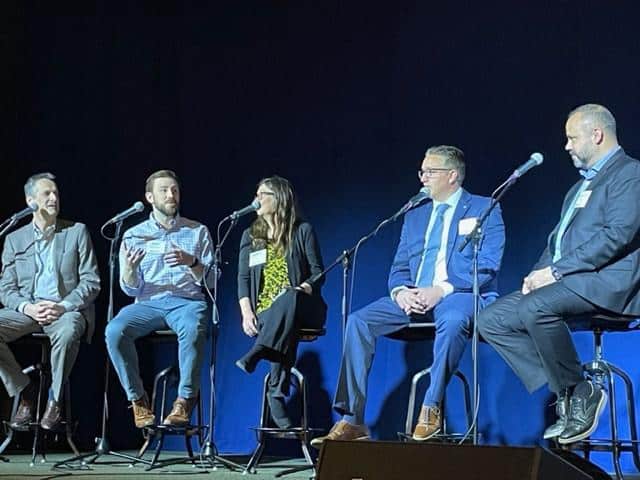From generative AI and voice assistants in our homes to complex algorithms in finance, artificial intelligence (AI) has permeated almost every aspect of our lives.
And nearly every week, it seems new advancements and tools are hitting the marketplace.
So, with AI being such a dominant force in today’s tech landscape, Technology Forum of Delaware hosted an event on March 22 to talk about how AI is being used to drive innovation and growth throughout the State of Delaware.
Below, we recap the event, entitled AI in DE, and show how AI is affecting tech, finance, social justice, and education throughout the state.
AI in DE
Throughout the State of Delaware, AI is being used in a variety of ways to improve efficiency, drive profits, educate, and make a positive difference in people’s lives.
The AI in DE event, which was co-hosted by Zip Code Wilmington – a nonprofit software development boot camp – showcased how a handful of companies and organizations are using AI to make a difference.
At the event, attendees heard from:
StratFI
Jim Lee, the founder of StratFI, spoke about how he and his company are using AI to forecast daily movements in the stock market up to 5 years in advance.
They do so with a machine learning (ML) module that considers seasonality, cycles, calendrical effects, and historical probabilities in order to assign an AI weighted factor.
They then use those factors to build a daily forecasting model that’ll inform them on whether or not to invest in the stock market on that day.
DuPont
Bernardo Tiburcio, Dupont’s Director of Digital Innovation, Data & Analytics, spoke about how AI has proven to be a key enabler of value for DuPont, the chemical company giant.
In addition to them using AI to forecast demand, which applies state of the art ML to predict sales, DuPont relies on AI for intelligent predictive maintenance.
By installing thousands of sensors on equipment to capture data in real-time, the company can predict failures on that equipment by measuring vibration, temperature, magnetic, and electrical data.
This results in earlier proactive maintenance, higher plant reliability, and saves the company on cost.
Tech Impact
Tech Impact is a nonprofit organization that offers technology services to other nonprofits to help empower them to better support their communities with solutions that promote productivity.
At the event, Ryan Harrington, the company’s Director of Strategy & Operations, spoke about how Tech Impact is using AI to build data products for social good, whether they be in housing, healthcare, or workforce development.
AI helps them collect data on the community, store it in an ethical way, and optimize it. It then uses that data to make predictions.
Tech Impact is then better informed on where to allocate resources, where to deploy programs in the community, and how to keep people enrolled in those programs.
University of Delaware
At the University of Delaware, Dr. Kathy McCoy, the University’s Co-Director of the AI Center of Excellence (AICoE), explained how UD is keeping up with the demand of AI in both research and teaching.
The University offers a BS degree with an AI concentration, multiple undergraduate and graduate courses, and they are in the process of developing a graduate AI certification. According to Dr. McCoy, AI has become one of the most sought-after concentrations among students seeking an Engineering degree.
The program focuses on two areas. The first being the research arm that focuses on AI research and the second being workforce development, which trains students to fill necessary workforce roles in the area of AI.
The State of Delaware
State of Delaware CIO, Jason Clarke, spoke about how AI assists the state by monitoring both cybersecurity threats and motor vehicle traffic.
Because there aren’t enough people to analyze and monitor all online activity, AI helps them fill the gap.
AI security monitoring tools look at trends to block threats, learn trends, and make predictions.
In just the 4th quarter of 2022, it blocked 567 billion unique cyber threats made against the state.
In terms of vehicular traffic monitoring, Delaware’s Department of Transportation has been awarded a federal grant to deploy an Integrated Transportation Management Program, which has enabled them to invest in fiber optic cables and other AI technology.
With this technology, the state is able to monitor traffic and make decisions that optimize traffic patterns.
Its predictive analysis can tell the difference between traffic being held up by work zones, accidents, inclement weather, and even holiday traffic. It then adjusts traffic patterns and lights to help keep traffic moving.
All in all, AI in DE was an informative and though-provoking event that brought AI experts and enthusiasts together to discuss the opportunities and challenges presented by this transformative technology.








